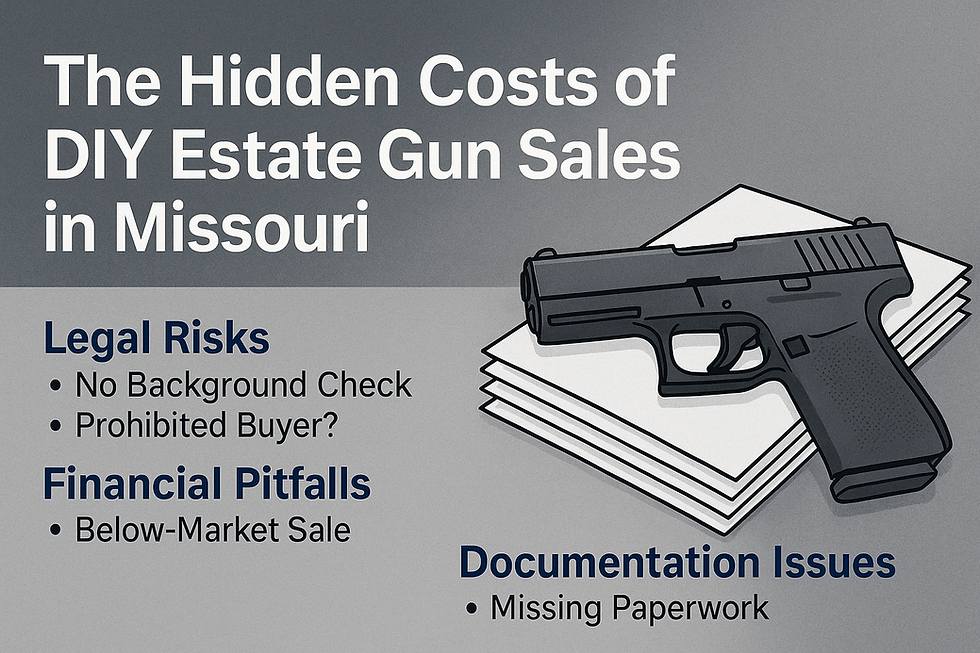The Hidden Costs of DIY Estate Gun Sales in Missouri
- Drew McDermott

- Nov 19, 2025
- 3 min read
When families in Missouri sort through an estate, they often find a few firearms tucked away in a safe or closet. The first thought is usually, “Let’s just sell them at the estate sale.” It seems simple, until it isn’t.
Selling firearms from an estate without understanding the rules can create serious legal, financial, and documentation problems. What looks like an easy sale can turn into lost value, invalid probate filings, or even federal exposure if done incorrectly.
Below, I break down the most common pitfalls of DIY estate gun sales in Missouri and show how to protect your family, your client, and the estate’s integrity.

Common Pitfalls
1. The DIY Temptation
Estate sales are built on convenience. Non-licensed sellers often list household goods, tools, and even firearms “on behalf of the family.” Most mean well, but firearms aren’t furniture, they’re regulated assets that require documentation and care.
Without an FFL or certified appraiser involved, sellers can’t confirm a buyer’s eligibility, track serial numbers, or create the records probate courts rely on. What starts as a quick transaction can later raise questions like, “Where did that gun go?” or “Was this sale even legal?”
2. Legal Risks Hiding in Plain Sight
Missouri law allows private firearm sales in many cases, but federal law still applies. Selling a gun across state lines, to a prohibited person, or without a traceable record can expose both the estate and the executor to risk.
Executors have a fiduciary duty to manage assets responsibly. If a firearm later surfaces in a crime or theft trace, an unrecorded sale can pull the estate, and the family, into a preventable mess.
For NFA items such as short-barreled rifles or suppressors, the danger is even higher. A simple misunderstanding about registration or Form 4 transfers can lead to felony level violations, even when the seller had no ill intent.
3. The Financial Cost of Guesswork
DIY sellers often underestimate the value of firearms, especially older or collectible models. Without a certified appraisal, estates routinely leave money on the table.
I’ve seen families sell heirlooms at a fraction of their worth simply because they compared prices to online classifieds or pawn offers. A proper appraisal based on Blue Book of Gun Values and Photo Percentage Grading System (PPGS) standards often reveals a 30–50% difference in fair market value.
Probate courts also require defensible numbers. A written offer or certified appraisal isn’t just paperwork, it’s proof of due diligence.
4. The Hidden Time Drain
Executors already juggle paperwork, deadlines, and family expectations. Adding “firearm seller” to that list rarely goes smoothly. DIY sales mean vetting buyers, fielding calls, packaging shipments, and learning transfer laws on the fly.
Licensed dealers and appraisers streamline that process. They handle the ATF forms, background checks, shipping, and records, so the executor can focus on settling the estate rather than managing firearm logistics.
5. Estate-Sale Guns: A Gray Area Worth Respecting
It’s common to see firearms listed in local estate sales or weekend auctions by non-licensed sellers “helping the family.” That practice sits in a legal gray area.
Selling on behalf of another person, especially when you’re handling multiple firearms or setting prices, can look a lot like engaging in the business of firearm sales without a license, something the ATF takes seriously.
Beyond legal exposure, there’s practical risk. Without background checks, a sale could go to a prohibited buyer. Without a written transfer record, the estate loses traceability. Without an appraisal, the heirs lose value.
Before any estate sale company lists firearms, they should partner with a local FFL. It keeps everyone compliant and documented, and it prevents simple oversights from becoming headlines.
6. The Safer, Smarter Alternative
Working with a licensed dealer or certified firearms appraiser eliminates most of these problems. At MDRF Enterprises, we:
Provide certified USPAP-aligned appraisals accepted by Missouri probate courts.
Handle ATF-compliant transfers with full documentation.
Offer written purchase offers that show comparable market values.
Manage in-home inventories discreetly and professionally.
The result: families get a fair, defensible outcome, and the executor can close the file knowing everything was handled legally and transparently.
Word from Drew
The “easy way” of selling guns from an estate often ends up being the most expensive path. Legal exposure, undervalued sales, and missing documentation can cost far more than a professional appraisal or dealer transfer.
If you’re handling an estate or working with a client who discovered firearms, start with an appraisal. It protects everyone involved and ensures those firearms are transferred, documented, and valued the right way.
Contact Us Today | Request a Free Appraisal
📞 Call us
(This article is for general educational purposes and not legal advice. For specific legal questions, consult an attorney.)




Comments